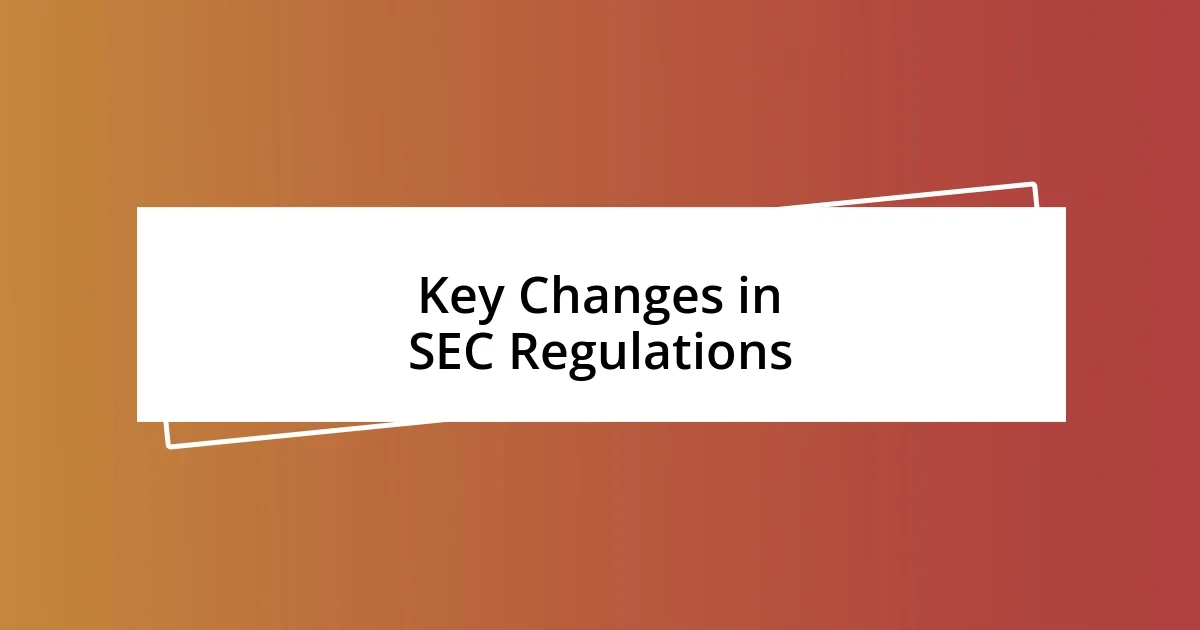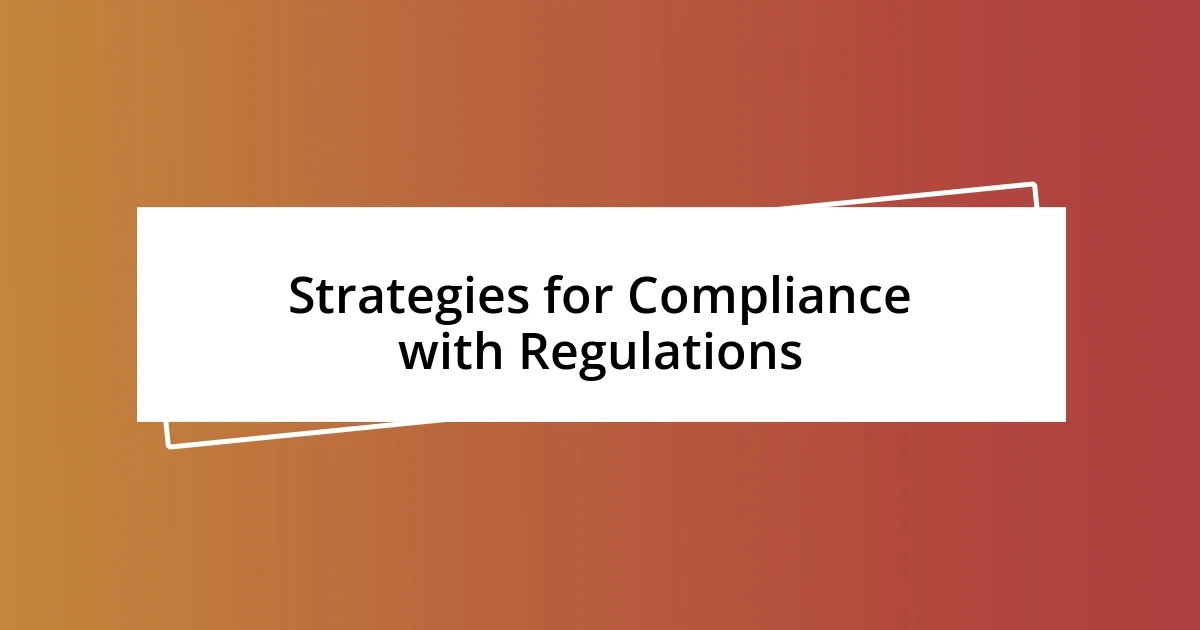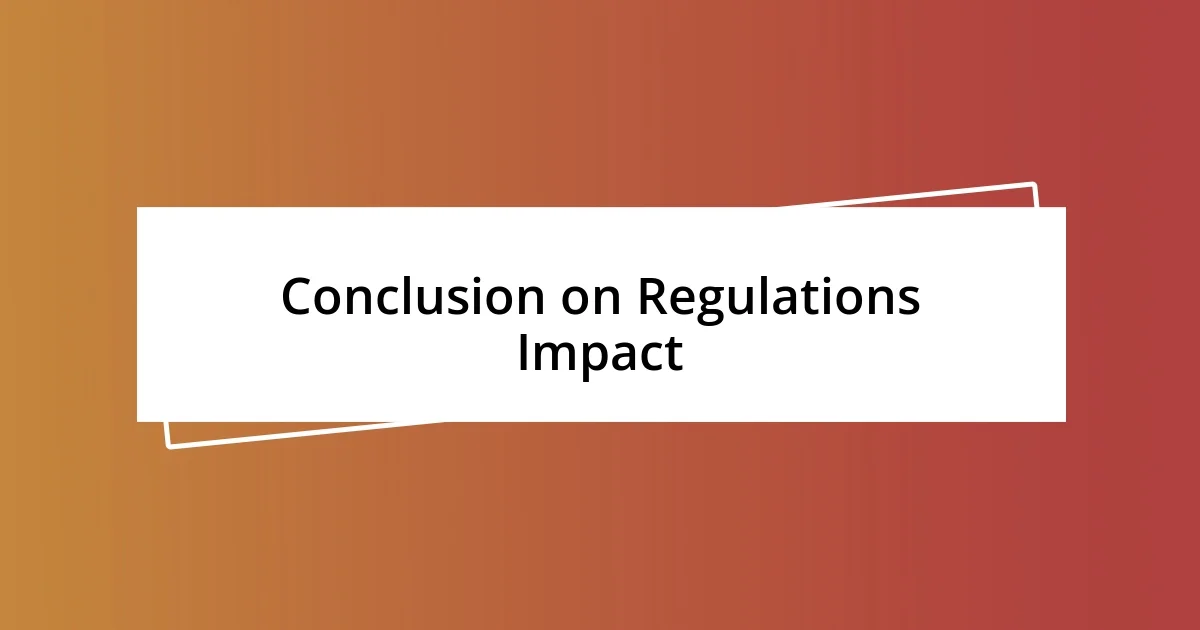Key takeaways:
- SEC regulations enhance corporate governance by promoting transparency and accountability, which can improve investor confidence and stock prices.
- Key regulatory changes, such as increased disclosure requirements and conflicts of interest regulations, drive companies to adapt, fostering opportunities for better governance and resilience.
- The future of SEC regulations is trending towards greater transparency and proactive enforcement, particularly in areas like ESG disclosures, emphasizing corporate responsibility and innovation in compliance strategies.

Overview of SEC Regulations Impact
The SEC regulations profoundly shape the landscape of the financial markets. I remember when I first encountered these rules during my early career in finance; the realization of their vast influence struck me. They not only set transparency standards but also foster investor trust, creating a safer marketplace.
One of the most significant impacts is on corporate governance. Have you ever considered how much a company’s reputation hinges on compliance? I’ve seen firsthand how maintaining rigorous oversight can make or break a firm’s credibility. When companies adhere to SEC regulations, they signal accountability to their stakeholders, which can enhance investor confidence and drive stock prices.
Moreover, the evolving regulations can drive innovation as companies strive to meet compliance requirements. I recently observed a small tech startup rise in the market by creatively integrating compliance into their business model. Isn’t it fascinating how the pressure to conform can lead to unexpected growth and innovation? In my experience, those who view regulations as a hurdle often miss out on opportunities for advancement.

Key Changes in SEC Regulations
Key changes in SEC regulations have had a ripple effect across various sectors, driving companies to adapt in order to stay compliant. I recall a moment during a compliance workshop where a seasoned executive shared how their company restructured entirely after new regulations were announced. It was eye-opening to see businesses pivot so dramatically, turning a challenge into an opportunity for more robust governance.
Some of the notable changes include:
- Increased disclosure requirements for public companies, aiming for greater transparency.
- Conflicts of interest regulations that tighten oversight on financial advisors.
- Enhanced reporting rules for investment funds, ensuring investors have access to critical information.
Witnessing these shifts firsthand, it’s clear that while compliance can seem daunting, it often leads to stronger business practices. Recently, I had a conversation with a friend who runs a financial advisory firm; she expressed how adapting to these new rules has made her firm more trustworthy in the eyes of clients, something that truly resonated with me.

Effects on Financial Markets
The influence of SEC regulations on financial markets is multifaceted. I’ve often observed that stringent regulations can initially cause volatility as investors react to the potential risks of compliance failure. However, in the long run, these regulations tend to stabilize markets by promoting transparency and fairness. For instance, I recall watching a major market dip during a regulatory announcement, only to see the market rebound as confidence in the long-term benefits grew.
Interestingly, SEC regulations also affect market entry and competition. Regulatory compliance can be a barrier for small or emerging companies, but I’ve seen how it can spur innovation. A former colleague of mine launched a startup that specialized in helping smaller firms navigate SEC requirements. This demand for compliance services not only made our industry more dynamic but also helped establish a level playing field. It’s remarkable how challenges can lead to new business opportunities.
In my experience, the overall impact of these regulations enhances market integrity. Investors are more willing to engage when they know there are safeguards in place. I remember chatting with a retail investor who hesitated before entering the market due to past fraud scandals. Once I explained how current regulations protect investors, their apprehension faded, and they felt empowered to invest. It reaffirmed my belief that effective regulations not only protect but also encourage capital flow into financial markets.
| Effect | Short-term Impact |
|---|---|
| Market Volatility | Increased reactions to compliance changes |
| Market Entry Barriers | Restricts smaller firms initially but fosters innovation |
| Investor Confidence | Enhances willingness to invest due to perceived safety |

Implications for Investors and Companies
I’ve seen firsthand how SEC regulations affect the decision-making processes of both investors and companies. For instance, during a recent investment seminar, I overheard a potential investor express frustration over the stringent disclosure requirements. But as I shared my thoughts on how these regulations safeguard their investments, I noticed their perspective shifted. It’s fascinating how transparency can transform reluctance into confidence, encouraging investors to take that leap.
On the company side, I think of an acquaintance who leads a mid-sized firm. They were initially overwhelmed by the new compliance mandates. However, as they navigated through the complexities, they discovered that these regulations not only pushed them to refine their internal practices but also opened doors to new partnerships. This experience made me realize that the implications of SEC regulations can be a double-edged sword—while they impose challenges, they can also foster resilience and growth.
I often wonder how many companies view these regulations as hurdles rather than stepping stones. In my conversations with entrepreneurs, I see a mix of apprehension and opportunity. One friend articulated that adapting to the changing regulatory landscape has instilled a sense of discipline in their approach to business. This reflection has led me to believe that the right mindset can turn the burdens of compliance into a competitive edge, leading to sustainable success.

Strategies for Compliance with Regulations
Navigating SEC regulations can seem daunting, but I believe that developing a robust compliance strategy is key. From my experience, one effective approach is to establish a dedicated compliance team that regularly reviews regulatory updates and assesses their impact on operations. Having a team in place not only ensures adherence to the regulations but also fosters a culture of compliance within the organization.
Another strategy I’ve found invaluable is investing in training for employees at all levels. Just last year, I attended a workshop where an expert emphasized how empowering staff with knowledge about regulations can lead to better compliance. It’s incredible how informed employees can identify potential risks and adopt best practices. Isn’t it reassuring to think that compliance doesn’t solely rest on the shoulders of the executive team?
Finally, leveraging technology can streamline compliance efforts. In my previous role, we implemented a compliance management system that tracked changes and alert us to potential compliance issues. It not only saved time but also reduced the stress often associated with regulatory changes. Have you ever considered how automation can turn what feels like a cumbersome task into a manageable workflow?

Future Trends in SEC Regulations
The future of SEC regulations seems to be leaning heavily toward increased transparency, especially in areas like environmental, social, and governance (ESG) disclosures. I recall attending a panel discussion where experts highlighted how firms will soon have to provide more detailed reports on their sustainability practices. It’s a change that’s not just regulatory—it’s a cultural shift towards corporate responsibility, and I can’t help but feel excited about how this trend could empower consumers to make more informed choices.
In my experience, as technology evolves, I see the SEC increasingly embracing fintech, which could lead to more streamlined regulations. Just a few months ago, I participated in a webinar on crypto-assets, where the speaker warned that regulatory frameworks must adapt swiftly to not stifle innovation. It’s fascinating to think about how these evolving regulations can protect investors while still fostering a dynamic market. Do you think this balance is truly achievable, or will the regulations bog down progress?
Moreover, enforcement actions by the SEC may become more proactive, leveraging data analytics to spot trends and abnormalities in trading patterns. I remember a conversation with a financial analyst who disclosed how the SEC has ramped up its monitoring efforts recently. It sparked a realization in me that companies can no longer afford to be complacent. This proactive stance means that organizations must remain vigilant and adaptable, which ultimately leads to a more fair trading environment. What does that mean for companies’ strategic planning in the future?

Conclusion on Regulations Impact
Reflecting on the impact of SEC regulations, it’s clear that these guidelines shape the way companies operate in today’s financial landscape. I’ve seen firsthand how embracing these regulations can actually become a competitive advantage. Companies that prioritize compliance not only mitigate risk but often discover efficiencies that drive their business forward.
As I navigate through the regulatory maze, I find myself pondering the emotional toll it can take on organizations. The stress and anxiety of keeping up with constant changes can feel overwhelming. However, I’ve witnessed that when teams rally together and embrace this challenge, they foster a sense of resilience that often transforms compliance into a shared mission rather than a burden.
In conclusion, the evolving nature of SEC regulations requires companies to be proactive and adaptable. This ongoing journey brings to mind the idea of growth through challenges. Have you ever noticed how organizations that embrace regulatory changes seem to thrive? I believe that in navigating these complexities, businesses not only secure their futures but also pave the way for a more transparent and equitable market for everyone involved.












